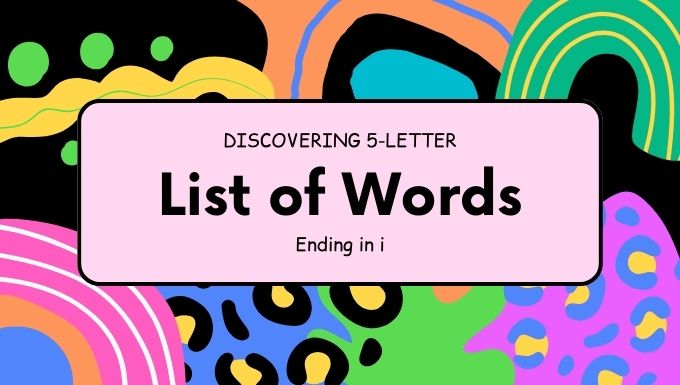
Are you a word game enthusiast or simply love exploring the intricacies of the English language? If yes, then today’s topic is tailor-made for you. We’re diving into the fascinating world of 5-letter words ending in i. These words aren’t just unique in their ending but also carry intriguing meanings and origins. Let’s embark on this linguistic journey!
Top Five, Five-Letter Words Ending in i
1. Sushi – A Culinary Delight
First up is a word that’s sure to make many mouths water – ‘Sushi’. This culinary term comes from the Japanese language and refers to a famous dish made of vinegared rice, usually with some sugar and salt, accompanying a variety of ingredients such as seafood, vegetables, and occasionally tropical fruits. It’s not just a food; it’s a symbol of Japanese culture and cuisine.
2. Taxi – More Than Just a Ride
Next, we have ‘Taxi’, a word so commonly used in our daily lives. A taxi is a vehicle licensed to transport passengers in return for payment of a fare. Originating from ‘taximeter cabriolet’, it’s fascinating how this word has been shortened and is now recognized globally.
3. Khaki – The Color of Versatility
Another interesting word is ‘Khaki’. Often associated with clothing, khaki refers to a light brownish color. It’s fascinating to know that it comes from Urdu and Persian, meaning ‘dust-colored’. Khaki pants are a staple in many wardrobes due to their versatility and neutral tone.
4. Delhi – A City Steeped in History
Moving on, ‘Delhi’ is not just any word but the name of India’s capital. It’s a city with a rich history, dating back thousands of years. From the Mughal Empire to British rule, and now as the heart of the largest democracy, Delhi’s story is as fascinating as its diverse culture and heritage.
5. Fungi – Nature’s Recyclers
Lastly, ‘Fungi’. This word refers to a kingdom of organisms that are crucial for the ecosystem. They decompose organic matter, recycling it back into the soil. Fungi include yeasts, molds, and mushrooms, playing a vital role in both nature and human life.

A Comprehensive List of Five-Letter Words Ending in i
- Umami:
- Meaning: A category of taste in food (besides sweet, sour, salt, and bitter), corresponding to the flavor of glutamates.
- Usage: “The soup has a rich umami flavor, thanks to the mushrooms and soy sauce.”
- Safari:
- Meaning: An expedition to observe or hunt animals in their natural habitat, especially in East Africa.
- Usage: “They went on a safari in Kenya to see lions, elephants, and giraffes.”
- Sushi:
- Meaning: A Japanese dish consisting of small balls or rolls of vinegar-flavored cold rice served with a garnish of raw fish, vegetables, or egg.
- Usage: “For her birthday dinner, she chose a sushi restaurant downtown.”
- Zombi (also spelled as “Zombie”):
- Meaning: A fictional undead being created through the reanimation of a human corpse, commonly found in horror and fantasy genre works.
- Usage: “The movie features a group of survivors in a post-apocalyptic world overrun by zombi.”
- Paoli:
- Meaning: The plural of Paolo, an Italian name, but can also refer to a currency unit in some historical contexts.
- Usage: “The antique coins were paoli from the early 19th century Italy.”
- Alibi:
- Meaning: An excuse or plea that a person was elsewhere when a crime was committed, used as a defense in criminal prosecutions.
- Usage: “His alibi for the night of the theft was confirmed by several witnesses.”
- Cacti:
- Meaning: Plural form of cactus, which are spiny plants typically found in desert regions.
- Usage: “We saw various types of cacti during our hike in the desert.”
- Skirti:
- Meaning: A type of skirt or a skirt-like garment.
- Usage: “She chose a colorful skirti for her dance performance.”
- Radii:
- Meaning: Plural form of radius, a line from the center of a circle to any point on its perimeter.
- Usage: “To calculate the area of the circle, you need to know the length of its radii.”
- Rabbi:
- Meaning: A Jewish scholar or teacher, especially one who studies or teaches Jewish law.
- Usage: “The community greatly respects their rabbi for his wisdom and guidance.”
- Origami:
- Meaning: The Japanese art of folding paper into decorative shapes and figures.
- Usage: “She spends her free time practicing origami, creating intricate paper cranes and flowers.”
- Lassi:
- Meaning: A traditional Indian drink made from yogurt, water, spices, and sometimes fruit.
- Usage: “On a hot day, a cool mango lassi is incredibly refreshing.”
- Bonsai:
- Meaning: The Japanese art of growing and shaping miniature trees in containers.
- Usage: “His collection of bonsai trees adds a serene and natural element to his apartment.”
- Swami:
- Meaning: A Hindu religious teacher or guru.
- Usage: “During my trip to India, I had the opportunity to speak with a swami about meditation practices.”
- Aditi:
- Meaning: A Hindu goddess, often considered as the goddess of the boundless sky.
- Usage: “In the ancient texts, Aditi is revered as the mother of many gods.”
- Genii:
- Meaning: Plural of genius, referring to an individual possessing extraordinary intellect or skill, or to guardian spirits in Roman mythology.
- Usage: “His paintings are the works of a true genii, blending creativity and skill.”
- Kukri:
- Meaning: A large knife with a curved blade, used especially by Gurkhas (soldiers from Nepal).
- Usage: “The kukri is not only a weapon but also a tool used in daily activities in Nepal.”
- Koali:
- Meaning: A type of flowering vine, often used in Hawaiian lei making.
- Usage: “The koali flowers brought a vibrant color to the handmade leis.”
- Alohi:
- Meaning: A word of Hawaiian origin, meaning “shining” or “brilliant.”
- Usage: “The alohi of the stars was especially noticeable on that clear night.”
- Chili:
- Meaning: A hot-tasting pod of red or green pepper, used in cooking for flavoring.
- Usage: “He added some chili to the sauce to give it an extra kick.”
- Kabuki:
- Meaning: A form of traditional Japanese drama with highly stylized song, mime, and dance, now performed only by male actors.
- Usage: “While in Tokyo, they attended a kabuki performance, which was a fascinating cultural experience.”
- Indri:
- Meaning: A large, tree-dwelling lemur found in Madagascar, known for its distinctive black and white fur.
- Usage: “The indri, with its loud call, is one of the most interesting animals native to Madagascar.”
Conclusion
Words ending in I may seem unusual at first, but they open up worlds of culinary delight, everyday convenience, natural beauty, historic grandeur, and ecological significance. These words, though small, hold within them vast meanings and stories. So next time you play a word game or simply ponder over the language, remember these fascinating five-letter gems. Language is not just a tool for communication; it’s a gateway to understanding diverse cultures, histories, and the natural world. Keep exploring and enjoying the beauty of words!